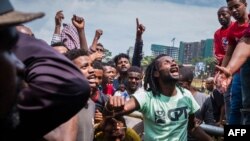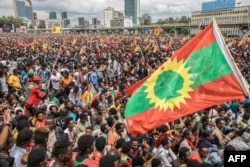Ethiopian authorities arrested more than 1,200 people after violence erupted in and around the capital this month, a senior police official said, three times more than earlier estimates.
Twenty-eight people died, the head of the capital's police commission, Degfie Bedi, said, raising the death count from 23.
"The majority were beaten to death. Seven were killed by security forces," he told journalists late Monday.
Violence that raged from Sept. 12-17 and included attacks on minorities in Ethiopia's ethnic Oromo heartland outside Addis Ababa, was a blow to new reformist Prime Minister Abiy Ahmed's efforts at reconciliation.
The unrest escalated on the day of a rally marking the return to Ethiopia of leaders of the exiled Oromo Liberation Front (OLF), which had waged a four-decade insurgency for self-determination for Ethiopia's largest ethnic group.
In the town of Burayu north of the capital, residents said shops were looted and people attacked by Oromo youths who stormed through streets targeting businesses and homes of ethnic minorities. Reuters could not confirm the accounts of who was responsible and the OLF did not comment.
"1,204 are in custody, but they are now being rehabilitated for a short period of time," the police commission's Degfie Bedi said. The arrested included people suspected of holding "illegal rallies," burglaries and other crimes, he added.
Ethiopia's Oromo, who make up about a third of the population, have long complained of being marginalized during decades of authoritarian rule by governments led by politicians from other smaller ethnic groups.
In recent years, the Oromo have been angered by what they see as encroachment on their land.
Abiy, himself the first Oromo leader in the ethnically diverse country's modern history, has pursued a reconciliation strategy since taking power in April.
He has released hundreds of people detained over past political unrest and ended a two-decade military standoff with neighboring Eritrea.






